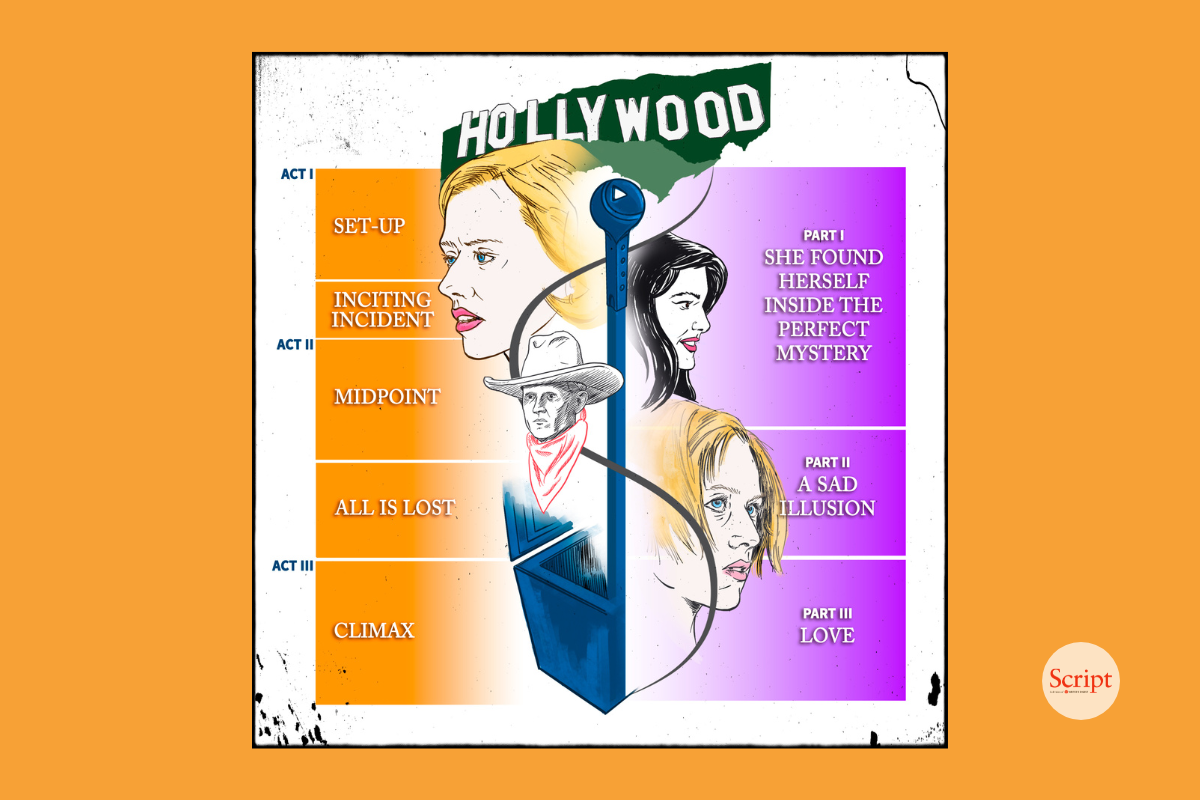Legally Speaking, It Depends: What’s a Spec Screenplay?
Many great articles on this site have been about how to write a killer spec, how to pitch it, how to sell it, how to spin a spec into a…
Many great articles on this site have been about how to write a killer spec, how to pitch it, how to sell it, how to spin a spec into a career and other aspects of the creative endeavor of writing. This article will focus on how a spec screenplay differs from other scriptwriting products and why knowing those differences is important to you as a writer.
What is a Spec?
A spec is not a very, very tiny printout of a script. The term is short for “written on speculation” and just like the speculators who risk investing in unproven commercial ventures in the hopes of striking it rich, writing a spec screenplay is a risky venture in that you could spend all that effort on creating something that no one is willing to purchase when it is done.
But unlike a poor business investment where the money is lost when the company folds, a written spec still can serve so many other, useful purposes to the career of the writer that the risk is worth it. It can serve as a writing sample to prove ability and acumen. It gives the writer practice in execution and flexes the storytelling muscles. And in the very least it shows that you can finish what you start and provides a sense of accomplishment. All worthy goals for any writer. In fact, I would venture to posit that every writer who is currently working in the industry has written a spec at some point in their career and benefited from it in some way.
Types of Scripts:
To distinguish a spec script from other forms of scripts a writer might be called to create, it's best we touch on what those other forms might be. Of course, the industry seldom keeps thing inside the lines and several of the following can be mixed together for a particular project, but, you'll get the idea. Some of the main concepts are:
Open Writing Assignments (OWA) – invitations by producers with others' ideas asking for you to pitch how you'd create a first draft. These could be preceded by just the idea/pitch, synopsis/outline, treatment, a purchased property in another form (e.g. a novel) or even previous scripts that may or may not be needed to be incorporated. Important point, the new writer isn't the driving force behind the story to be told. The train is already moving when the writer gets on.
Adaptation – take a previously expressed idea in another form and make a script out of it. Again, the scriptwriter isn't the main source of inspiration. Unless you're Charlie Kaufman, an adaptation has to adhere pretty closely to the concepts and story contained in the original work. Within those parameters a skilled writer can be very creative and needs to be to achieve success, but, the screenwriter isn't the sole creator and has to keep that in mind while writing.
Page 1 Rewrite – Ignore what's come before, whoever wrote it and create a complete draft. At any point in development, a writer can be brought in on a troubled production to give a completely fresh approach. It is still based upon the ideas, concepts or property that came before. The new writer has to go in another direction, but, starts from the same starting blocks as the previous screenwriter(s). Again, you're not driving the boat.
Rewrite – someone else has taken a crack, you attempt to fill in the gaps of the cracks they left (sometimes results in a page-1 rewrite). A regular rewrite brings on a new screenwriter to embellish and “fix” the problems left by a previous screenwriter. Sometimes it is because the previous screenwriter can't figure out how to un-dig the holes they've dug. More often it has nothing to do with the abilities of the previous writer and is a business or personality decision to bring on fresh blood. Regardless, the new writer has to follow the desires of someone else to get the script in a shape that they'll be happy with. The writer is playing second fiddle (but at least they're being paid to be in the band.)
2nd, 3rd, 4th, nth draft – taking your own previous completed draft and re-tackling significant parts of it (or the whole thing). This usually requires making changes, some drastic, some subtle before being replaced by another writer. In this case, from the second draft on the screenwriter's input is secondary to the wants and desires of the driving force of the production. Even if the first draft was a spec, the changes in direction are steered by another.
Polish – intended to be a minor brush up, no major changes much less than a new draft. This is a tricky and oft abused distinction, but, an important one for a writer to understand, since pay grade hangs in the balance. A polish is somewhat less than a new draft, but, it requires rewriting bits. How many bits and how changed they become are gray areas, but, the rule of thumb should be that you aren't changing enough to alter a direction or significantly impact what was on the page before. It is best exemplified in punching up dialog. The reason it can be tricky for a writer is when a producer is paying you for a polish but keeps asking for changes that more reflect a new draft. The WGA minimums have a significant difference in rates between those two requests so a writer needs to realize when they are being taken advantage of. Still, the grey areas of just what a polish can be and when a new draft starts, as well as keeping the business relationship with the person calling the shots makes deciding what to do about a disagreement a personal decision. The writer is still acting on the desires of another for the script's execution, so, communication is key to keep both sides from feeling like being exploited, while keeping the writer employed on the worthwhile project. A tricky balancing act in most instances.
Spec – written without a request or obligation or any guarantee of sale. A complete first draft is written without any assurances that someone might be interested in making the movie. This is the one and only time when a writer retains complete control over what happens in the script. And once written, the script becomes a purchasable property that an interested producer must acquire in order to make the film. It is an asset, just like the rights to a novel, and as such it must be legally conferred to the new owner. The efforts of writing the script are not compensated for or guaranteed before writing commences, as in the other types of screenwriting. If a producer wants a spec that they've read, they have to purchase or at least option (see previous article describing the difference) the rights to use it. That's where a writer can recoup their sweat equity in creating it.
Why Write a Spec?
Why in the world would a writer ever choose to write a spec if there is no pay day in sight when you start? Total control is one reason. And it goes beyond the free creative control you get as a writer writing your own thing. The new script has no ties to anyone else's ideas, no onus of keeping faithful to another's vision. A spec is truly and wholly owned by the writer. The writer is the “author” of the copyrighted work in one of the rare instances where the legal terminology makes perfect sense.
As long as the spec is not based on any previous work, the writer also owns the work outright at the outset. (And as discussed in my previous article on adaptation, a writer shouldn't attempt a spec based on someone else's work since it robs you of this main benefit coming out of the risk.) This allows all the power of decision making to rest in the hands of the writer. For one of the few times in the career of the writer, you are in the driver's seat. (You thought I'd exhausted my motion/driving analogies?)
Being in control means you can decide whether to sell the spec, make demands in the negotiation for the rights to make the movie and/or stipulate conditions for the sale that would otherwise be outside the reach of filling the role of one of the other writing types above. Don't let the power go to your head, but, recognize that it is a different place from which to negotiate.
Don't worry, though. The WGA has set minimums that take the sale of a spec into account so that a writer selling one doesn't get stiffed for all the work they did without a producer goading them on.
Why are the differences important?
In the short of it, money and control. What a piece of writing is called determines how much it costs the producer to acquire. According to WGA minimums, a draft costs more than a polish. In terms of control, an OWA or previously existing work owned by the producer means that a writer is likely not going to own the work they create (as long as the formalities of the work made for hire statutes are followed). If a writer walks in with a spec, they own and control all aspects of what can be done with the script – until they actually sell it, of course.
Knowing the differences allows a writer to know when they are in control, when they need to let go, know how much they should be paid and when for the service being requested, or knowing when to not take the job.
Hopefully, this brief overview will help guide you in your decisions and help you recognize your opportunities and responsibilities as you take on the various tasks of a working writer. As always, it depends...
If you're in the neighborhood and would like to say hi, I'll be a panelist and lab mentor at the Capital Cinema Cultural Exchange in Albany, NY March 14-17, 2014.
Download Your FREE How to Write a Screenplay Webinar
ScriptMag editor, Jeanne Veillette Bowerman takes you through the steps she uses to write a spec screenplay.
Related Articles:
- More Legally Speaking, It Depends articles by Christopher Schiller
- Script Angel: How to Get From Story Idea to Polished Screenplay
- Meet the Reader: Screenplay Premises – It’s Complicated
Tools to Help:
Christopher Schiller is a NY transactional entertainment attorney who counts many independent filmmakers and writers among his diverse client base. He has an extensive personal history in production and screenwriting experience which benefits him in translating between “legalese” and the language of the creatives. The material he provides here is extremely general in application and therefore should never be taken as legal advice for a specific need. Always consult a knowledgeable attorney for your own legal issues. Because, legally speaking, it depends... always on the particular specifics in each case. Follow Chris on Twitter @chrisschiller or through his website.







